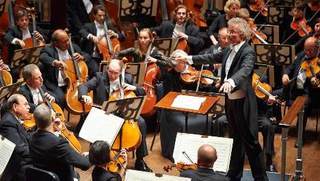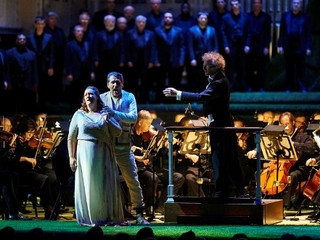|
Back
...But Only Strauss Can Make A Tree New York
Avery Fisher Hall, Lincoln Center
07/15/2015 - & July 18, 2015
Richard Strauss: Daphne, opus 82
Regine Hangler (Daphne), Andrea Schager (Apollo), Norbert Ernst (Leukippos), Nancy Maultsby (Gaea), Ain Anger (Peneios), Christopher Feigum, Matthew Plenk, Ryan Speedo Green, Nikola Budmir (Shepherds), Lauren Snouffer, Anya Matanovic (Maids)
Collegiate Chorale, James Bassi (Music Director), The Cleveland Orchestra, Franz Welser-Möst (Music Director and Conductor)

F. Welser-Möst & Cleveland Orchestra (© Roger Mastroianni)
Lincoln Center advertised Daphne as “the greatest Strauss opera you never heard of.” (Or words to that effect.) Well, some of us last night had not only heard Daphne but have revered its passionate music–even if the music is about a girl who prefers trees to passion!!
Why is Daphne so rarely performed? Two possible reasons. The length, at 90 uninterrupted minutes, is too short for a full evening. And the role for our heroine is not only extremely difficult but is sung for virtually the entire opera. Add to that the other rules–a mother whose contralto runs the full gamut down to E-flat, an old fisherman father, who has to sing his bass role like Boris Godunov, and Apollo, a bumbling god which deserves a heldentenor of the most wickedly brazen voice.
Yet when we have an orchestra like the Cleveland Orchestra, and a cast which turns this “bucolic tragedy” into a full-blown mini-Wagnerian opera, then Daphne can become a triumph, which it almost was last night.
Even the story is simple: virgin teenager Daphne doesn’t want to copulate with either her teenage suitor or the god Apollo. She prefers nature: birds, winds, flower, and, above all, trees. So when Apollo mistakenly shoots her suitor, he makes amends by turning Daphne into what she’s always wanted: a tree!!
Whether this makes sense is not important. Strauss, an ingrained nature-lover with an adoration for Greek legend, made his librettist write a work not only extolling the heroine but giving nuances about the twilight of the gods–and the hopes from Daphne’s father that they will come back to earth again.
Mainly, though, this is a piece which enjoins the simple music of a Greek legend, with the Strauss love of the soprano voice, with the paradox of extreme passion for a woman who has no passion whatsoever.

R. Hangler, A. Schager, F.Welser-Möst (© Roger Mastroianni)
One very strong caveat about this performance. It was–literally–and unfortunately–produced as a concert opera, with no allowances for the drama.
When Alan Gilbert conducts a concert opera, he offers as much action as possible, so that one gets the idea of what is happening (without, perhaps, the nuances and dramatic layers). No attempt was made here to give a single “action.” The actors were dressed in tuxes and formalwear. They entered, stood on each side of the podium and exited.
Would anybody who didn’t know the story have known about the lascivious kisses which mortify Daphne? Would they have known that Leukippos was disguised as a woman? (Great operatic fun for Strauss.) That Apollo would have shot him with an arrow and killed him? Would they have even known that the offstage Daphne was actually turned into a tree?
Nothing in the production even hinted at this, for both the German and English subtitles only hint that “something” is going on.
But New York audiences appreciate great singing, and–wow!!!!–did conductor Welser-Möst have some great singers. Regine Hangler as the eponymous heroine, has an almost non-stop melody for all 95 minutes. It is rich, difficult, needs a purity of voice–and Ms. Hangler had it all. In her wondrous first aria in praise of nature, she–and the woodwinds of the Cleveland Orchestra–made it come alive. More important, with the death of her suitor, Ms. Hangling changed her voice from the euphoria of nature and the naïveté of believing Apollo is her brother, to a real the love-death woe of lamentation. Her voice had the suppleness to offer all the emotions.
This might have been “bucolic”, but the other singers actors had Wagnerian passions.
Both Norbert Ernst and Ain Anger as her teenage boyfriend and her fisherman father, had voices equally rich, firmly comparable with Ms. Hangler. Nancy Maultsby (the only American principle) was a wonderful mother. But her real shining came at the start in the duet with her daughter. A ravishing beginning in every way.
I had problems with Andrea Schager as Apollo, for the wrong reasons. The others in the ensemble–including the most luscious duet of the maids, Lauren Snouffer and Anya Matanovic–comprised such a faultless ensemble. Mr. Schager was the heldentenor incarnate: a brash almost brassy, Tannhäuser with a power that simply outsung everybody else.
An amazing voice, a voice which would make any Wagner (and he is due to play Parsifal this year) a great opera. And yes, he is supposed to be a god. Though he’s a bit of a blunderer as a god. He lets his cattle rush away from him (giving Strauss more opportunity to orchestrate a cattle stampede), he mistakenly kills a mortal, and he has to apologize to Zeus. Most of the others have god-like backgrounds as well, so Mr. Schager stands out, not really part of the ensemble.
This, though is a minor point for Strauss’ fable. It is, after all, basically one of the Strauss heroine-monodramas, alone with Salome and Elektra, and Ms. Hangler carries it off with shining colors.
She and of course the Cleveland Orchestra. Those winds which play the short overture and a few interludes, are given the Elysian spirit, the large orchestra whose part is as difficult as Ms Hangler, displays not only the Welser-Möst conception but that perfection which George Szell gave them many decades ago.
Most essential, this is a great–and I use word carefully–Strauss opera. Even if the audience may have been confused by the story, or why the soprano sung her Transformation Scene offstage, they could never resist music which–while old-fashioned by 1938 standards–is as lyrical and passionate as anything Strauss ever wrote.
I would never vulgarize this performance by saying that Ms. Hangler, as the laurel tree, took many a bough on stage, or that the audience rose to their feet in Daphne-ing applause. Instead, let’s say that hearing this unjustified rarity was 95 minutes of unfettered joy. Whatever Strauss’s advanced age or his position in the Nazi era, his inspiration never deserted him here.
Harry Rolnick
|